Many bloggers begin their journey on Blogger because it’s a free and straightforward platform. However, as your blog grows, you might start feeling restricted by its limited features.
Switching to WordPress can open up a world of possibilities with its extensive capabilities. But there’s a common concern about making this move: the potential loss of Google rankings.
This article will guide you through the process of transitioning from Blogger to WordPress. We will focus on how to do it correctly, making sure you keep your valuable Google rankings intact.
Our goal is to help you upgrade your blogging platform without sacrificing the SEO efforts you’ve already put into your site.
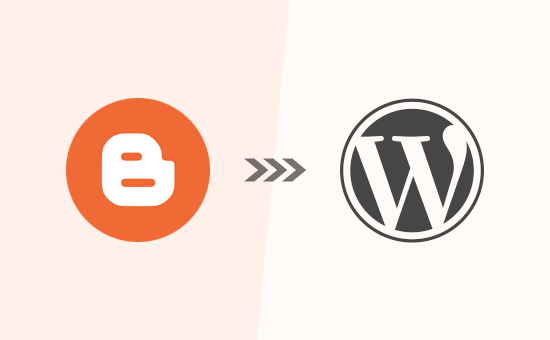
Why Move From Blogger to WordPress?
Blogger is a popular blogging platform created by Google. It allows anyone to create a free blog using their Google account.
However, many beginners soon realize that there are a lot of limitations on what they can do with their free Blogger blog.
WordPress, on the other hand, gives you complete ownership of your website. It also allows you to add the necessary features to grow your blog and monetize your content. Plus, you can perform all the SEO optimizations to rank higher. We have created a detailed side-by-side comparison of WordPress vs. Blogger.
It’s important to note that when we say WordPress, we are talking about self-hosted WordPress.org, which should NOT be confused with WordPress.com, which is a hosted solution that has its own limitations. For details, see our article on the difference between WordPress.com vs. WordPress.org.
WordPress.org is the popular “WordPress” platform that you have likely heard about because it powers 43% of all websites on the internet.
That being said, let’s take a look at how to properly move from Blogger to WordPress while preserving your Google search rankings and website traffic.
Here are the steps that we will use to transfer from Blogger to WordPress:
Ready? Let’s get started.
Video Tutorial
If you don’t want to watch the video tutorial, then you can continue reading the text version below.
Step 1: Sign Up for WordPress Hosting
To get started with WordPress, you will need a domain name and web hosting.
For a quick reminder, a domain name is your website’s address that people type to get to your blog, and web hosting is where your website files are stored. Both of these are a MUST-HAVE to create any type of blog or website.
With that said, we recommend using Bluehost. They are one of the largest hosting companies in the world, and they are an officially recommended WordPress hosting partner.
Because WPBeginner is the largest WordPress resource site, they have agreed to offer our readers a free domain name and a 60% discount on hosting. Basically, you can get started for just $1.99 per month.
If, for some reason, you would prefer to go with a Bluehost alternative, then we recommend using either SiteGround or Hostinger because both are excellent solutions.
Once you have signed up for the WordPress hosting plan and set up your domain name, you can go ahead to the WordPress installation step.
If you sign up with Bluehost using our link above, then they will install WordPress for you automatically.
If you used a different WordPress hosting provider, then you need to install WordPress by following our ultimate guide on how to install WordPress.
After you have installed WordPress, it is time to move your content from Blogger to WordPress.
Bonus Free Offer: Since a lot of you asked for this, we are now offering a free Blogger to WordPress migration service as part of our free WordPress blog setup service. This means one of our expert team members will do the entire migration for you (100% free). Yes, you can literally switch from Blogger to WordPress without any risk.
Note: Our free blogger migration service is for smaller blogs that have less than 1000 blog posts. We can offer a migration service for larger blogger sites, but that will be a paid service.
However, if you are someone who likes learning and doing things yourself, then you can follow our step-by-step tutorial below.
Step 1: Export Your Blogger Blog
The first thing you need to do is export your Blogger blog’s content.
You can do this by visiting the Blogger website and logging into your account dashboard.
After that, go to the Settings page. Scroll down to the ‘Manage Blog’ section, and click the ‘Back up Content’ button.
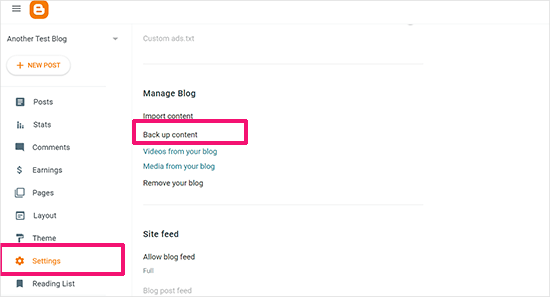
This will bring up a popup showing what exactly is included in the Blogger backup.
You need to click on the ‘Download’ button to continue.
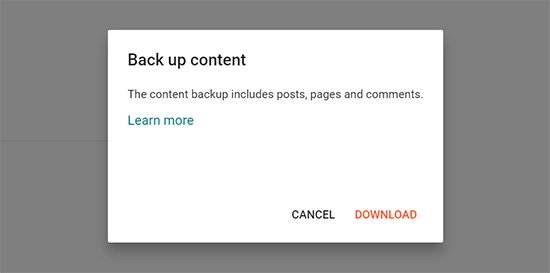
Your Blogger blog’s content will be downloaded to your computer in an XML file.
Once the download is complete, it is time to import your Blogger content into your WordPress site.
Step 2: Import Blogger to WordPress
To start importing your Blogger site into WordPress, log in to your WordPress admin area and visit Tools » Import.
On the Import page, go ahead and click on the ‘Install Now’ link below Blogger.
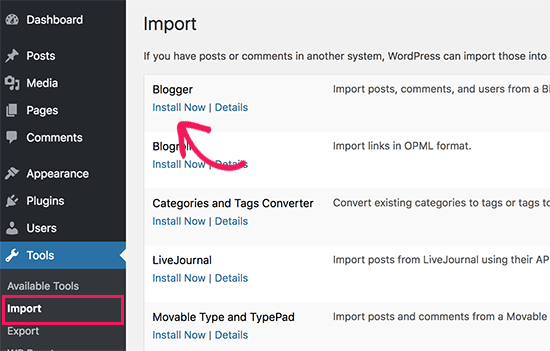
WordPress will now download and install the Blogger Importer plugin for you.
Once it has finished installing, you need to click on the ‘Run Importer’ link to continue.
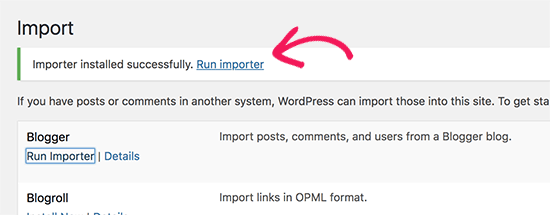
WordPress will ask you to upload the XML file on the Import Blogger screen. This is the file that you downloaded in Step 1.
Simply click the ‘Choose File’ button and upload the XML file you downloaded earlier.
Next, click on the ‘Upload file and import’ button to continue.
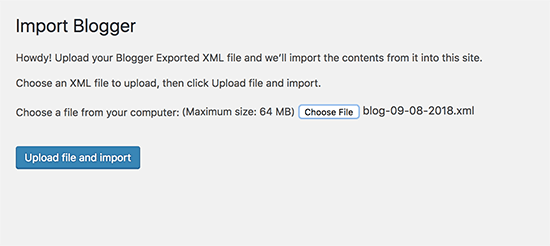
WordPress will now upload the import file. If your import file is too large, then you may see an error message.
In this case, you will need to increase your maximum file upload limit. If your file is small, then you won’t see any errors.
Next, you will be asked to assign posts to an author. If you have multiple authors on your Blogger blog, then you can create a new user account for each author. You can also assign these posts to existing authors on your WordPress website.
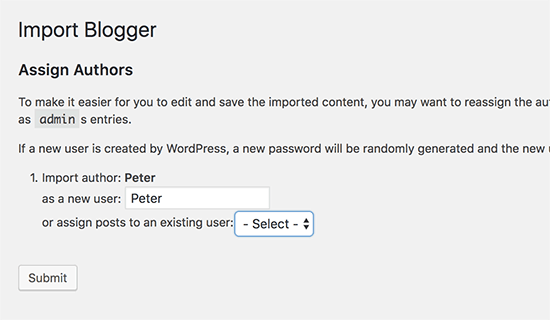
After making your selection, click on the ‘Submit’ button to continue.
WordPress will import all content from the Blogger export file to your WordPress site. You can view the content by visiting the Posts » All Posts page.
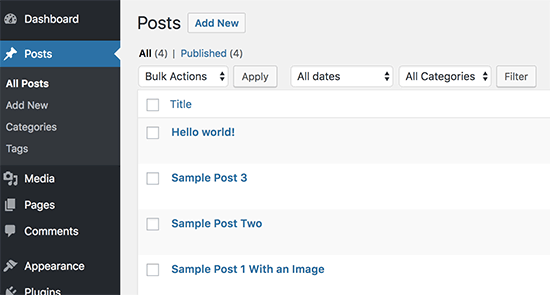
Step 3: Setting Up Permalinks
Permalinks is the term used for the URL structure of individual pages. WordPress comes with a feature that allows you to set up an SEO-friendly URL structure.
Since you are importing content from Blogger, you need your URL structure to be as close to your old Blogger site’s URL structure as possible.
To set permalinks, you need to go to Settings » Permalinks in your WordPress dashboard and choose the ‘Custom Structure’ option.
After that, you need to add the following text in the box next to the custom structure field:
/%year%/%monthnum%/%postname%.html
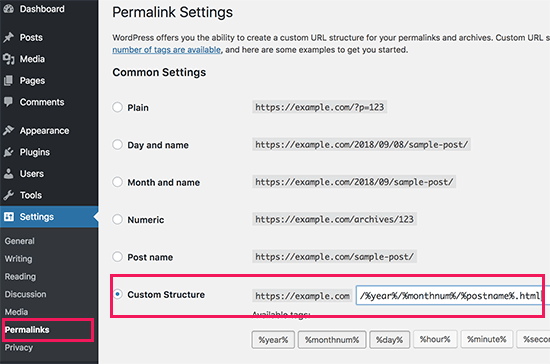
This permalink structure makes your blog post URLs similar to the URLs on your old Blogger blog.
However, sometimes your blog post URL, also known as a slug in WordPress, will not match the slugs used by Blogger.
To fix this, you will need to create and run a little code snippet.
We recommend adding this PHP code using the WPCode plugin. It is the safest way to add custom code to your WordPress website. For more details, please see our guide on how to copy and paste code snippets in WordPress.
add_action( 'init', 'wpb_update_slug' );
function wpb_update_slug() {
global $wpdb;
$result = $wpdb->get_results("SELECT post_id, meta_value FROM $wpdb->postmeta WHERE meta_key = 'blogger_permalink' ");
$wpdb->print_error();
foreach ($result as $row){
$slug = explode("/",$row->meta_value);
$slug = explode(".",$slug[3]);
$wpdb->query("UPDATE $wpdb->posts SET post_name ='$slug[0]' WHERE ID = '$row->post_id' ");
}
echo "DONE";
}
After saving the code, you just need to visit any page on your WordPress site to trigger this script.
Important: After the script has run, don’t forget to disable or delete it from your WPCode library because it only needs to run once.
Bonus Free Offer: Don’t want to deal with code? We have got you covered. Since many of you asked for this, we are now offering a free Blogger to WordPress migration service as part of our free WordPress blog setup service.
This means one of our expert team members will do the entire migration for you (100% free). Yes, you can literally switch from Blogger to WordPress without any risk.
Step 4: Set Up Redirects From Blogger to WordPress
The most important step in moving any website is to set up proper redirection so that you don’t lose any existing traffic or SEO rankings. You can see our ultimate WordPress SEO migration checklist for more details.
Note: If your Blogger blog has its own custom domain instead of blogspot.com, you may need to point your domain nameservers to your hosting provider. For instructions, please follow our tutorial on how to switch custom domain blogger blog to WordPress.
The crucial part of the redirection is to ensure that your users land on the same page on the new domain they were trying to access on the old site.
At the same time, you also need to ensure that search engines understand that your website is moved to this new location.
You need to install and activate the Blogger to WordPress Redirection plugin to do that. For more details, see our step-by-step guide on how to install a WordPress plugin.
Upon activation, you need to visit the Tools » Blogger to WordPress Redirection page and click on the ‘Start Configuration’ button.
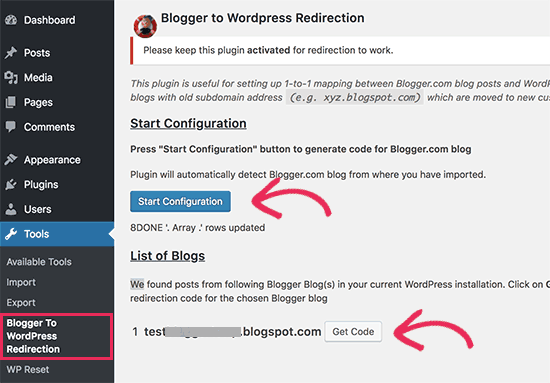
The plugin will now detect the URL of your Blogger blog and show you the option to get a redirection code. Go ahead and click on the ‘Get Code’ button next to your Blogger URL.
It will now generate a code snippet that you need to properly redirect users from your old Blogger blog to your new WordPress site.
Next, you need to log in to your Blogger dashboard and go to the ‘Themes’ page. Click on the dropdown arrow on the ‘Customize’ button next to your theme, and then select the ‘Edit HTML’ option.
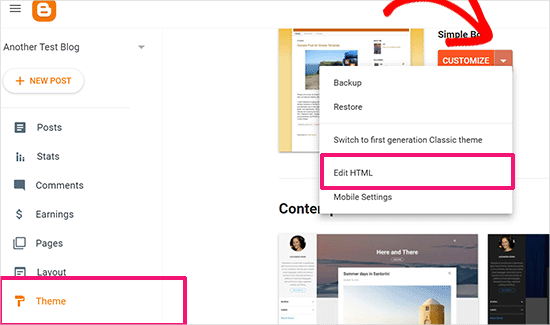
Blogger will now display the custom HTML code for your theme template. If you made any customizations to your Blogger theme, then you may want to copy the code and save it on your computer as a backup.
Otherwise, you can just go ahead and delete everything. After that, copy the code displayed by the plugin on your WordPress site and paste it into your Blogger theme editor.
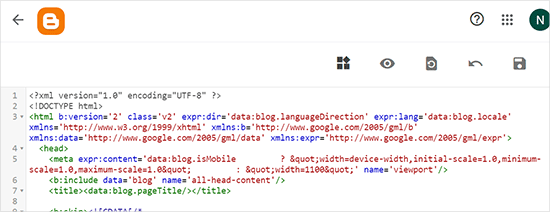
Don’t forget to click on the ‘Save theme’ button to store your changes.
Next, we need to set up redirects for mobile users.
You need to go back to the Themes page in your Blogger blog’s dashboard. This time you need to click on the gear button below the mobile preview of your blog.
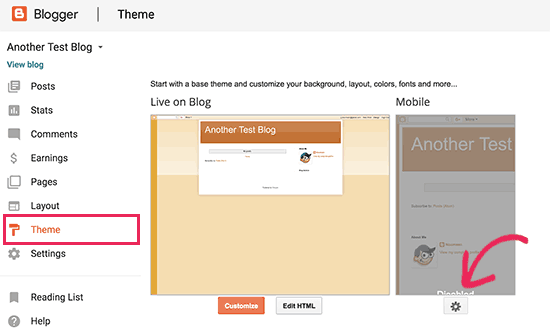
This will bring up a popup where you need to select the ‘No. Show desktop theme on mobile devices’ option.
Then, click on the ‘Save’ button.
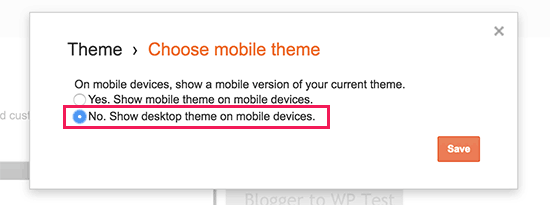
That’s all, your Blogger blog will now redirect all your blog visitors to your new WordPress blog.
Alternatively, you can also use All in One SEO (AIOSEO) to redirect posts and pages from Blogger to WordPress. The plugin offers a powerful redirection manager feature that lets you set up full site redirects to your new site.
Plus, you can enable 404 error tracking and catch any broken links that may occur when moving your site to WordPress. This will help improve the user experience, and you won’t lose keyword rankings.
Step 5: Moving Other Content From Blogger to WordPress
In this step, we will move the remaining content from the old blog on Blogger to your new WordPress blog. This may require some manual work, depending on the settings/content of your blog.
1. Moving Pages From Blogger to WordPress
WordPress’s Blogger importer tool only imports Blogger posts and ignores pages.
To move your pages into WordPress, you will have to edit each page in your Blogger blog, copy its contents, and then manually create a page in WordPress.
To learn more about pages, see our article on the difference between posts vs. pages in WordPress.
Now, you will come across another issue. The Blogger pages have URLs that look like this:
http://example.blogspot.com/p/about-us.html
Your WordPress page URL will look like this:
http://example.com/about-us
To fix this, you will need to use the All in One SEO (AIOSEO) plugin. For instructions, please see our beginner’s guide on creating redirects in WordPress.
2. Widgets
Like Blogger, some WordPress themes also utilize widgets to add content to your blog’s sidebar.
To add widgets, you need to visit the Appearance » Widgets page in your WordPress dashboard and simply drag/drop widgets into the sidebars. For detailed instructions, see our guide on how to add and use widgets in WordPress.
If you are looking for a specific widget you don’t see in WordPress by default, then you likely need a WordPress plugin. You can search WPBeginner’s best WordPress plugin category to find the functionality you want.
3. RSS Feeds
Search engines and users who subscribe to your blog posts via RSS feeds will still be able to find your blog. However, they will not get any new content.
To fix this, visit the Settings page under your Blogger account. Next, scroll down to the ‘Site feed’ section and click on ‘Post feed redirect URL’.
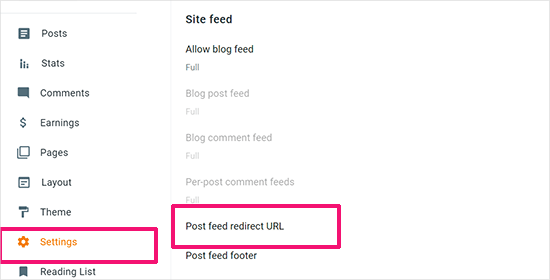
This will bring up a popup where you need to add the RSS feed URL of your WordPress website.
Your WordPress feed URL will look like this:
http://example.com/feed
Don’t forget to replace example.com with your own domain name.
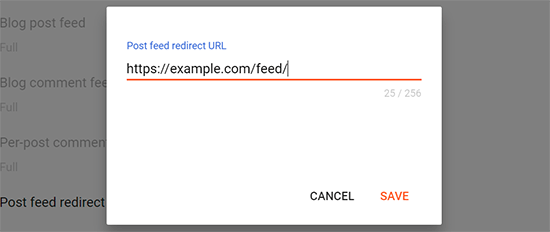
Click on the ‘Save’ button to add the URL and save your settings.
Step 6. Things to Do After Migrating From Blogger to WordPress
Now that you have successfully moved your Blogger blog to WordPress, let’s take a look at what else you can do to improve your blog.
We have created a checklist of the most important things you need to do after installing WordPress.
WordPress is quite easy to use. However, you’ll occasionally discover new things that you may need help with. This is where WPBeginner comes in.
WPBeginner is the largest free WordPress resource site in the world. We regularly publish tutorials and guides written specifically for bloggers and small businesses.
Here are some of the useful resources that you will find on WPBeginner (all of them are free):
- WPBeginner Blog – The central place for all our WordPress tutorials and guides.
- WPBeginner Dictionary – Our WordPress glossary is the best place to familiarize yourself with the WordPress lingo
- WPBeginner Videos – New WordPress users can start with these step-by-step videos to master WordPress.
- WPBeginner on YouTube – Need more video instructions? Subscribe to our YouTube channel with more than 291,000 subscribers and 50 Million+ views.
- WPBeginner Blueprint – Check out the plugins, tools, and services that we use on WPBeginner.
- WPBeginner Deals – Exclusive discounts on WordPress products and services for WPBeginner users.
We hope this article helped you switch from Blogger to WordPress without affecting your Google search rankings. You may also want to see our guide to which WordPress plan you should use or the most common WordPress myths debunked.
If you liked this article, then please subscribe to our YouTube Channel for WordPress video tutorials. You can also find us on Twitter and Facebook.





Syed Balkhi says
Hey WPBeginner readers,
Did you know you can win exciting prizes by commenting on WPBeginner?
Every month, our top blog commenters will win HUGE rewards, including premium WordPress plugin licenses and cash prizes.
You can get more details about the contest from here.
Start sharing your thoughts below to stand a chance to win!
Marco Dickert says
Hi there,
I just tried to migrate my blogger-blog to my self-hosted wordpress. Almost all things work as expected, but not the redirection from blogger. I inserted a logging function in the template code for the wordpress-sided interface and recognized that this page does not get any parameters from the blogger redirection. That means I simply get redirected to my home page.
Is it possible that blogger changed variable names or something? Does anyone has an idea how I could fix that problem?
Cheers, Marco
WPBeginner Support says
Marco, we have just updated the post with a completely new re-written version. Please follow it now, hopefully it will resolve your issue.
Admin
Marco Dickert says
@WPBEGINNER Support:
First of all: It’s really nice that you’ve updated this article! I guess you help many users with that.
Meanwhile I solved my problem, and wrote my solution in an email to Amit Agarwal, but he seems to be very busy.
Since I come from Germany I don’t get “blogspot.com”-Domains in my Google search results, but “blogspot.de”. Others in German-speaking Europe get also different TLDs like “blogspot.at” or “blogspot.ch”. That is a problem for the template code. I could fix that simply by changing these lines:
$tld_fix = preg_replace("/blogspot\.[a-zA-Z0-9]+/", "blogspot.com", $old_url); $permalink = explode("blogspot.com", $tld_fix);With this fix it should work all around the world. Maybe you can implement it in your post; it might be useful for some people.
Cheers, Marco
WPBeginner Support says
Thanks Marco for this really useful fix. We have updated the article to include this.
nil says
Hey,
I have the same problem. Tried your script but when I go to an old posting I just get redirected to my first page, not to the post.
Regards
nil
Liza Pritz says
Wouldn’t it be easier to use a plugin? Something like “CMS2CMS Blogger to WordPress Converter” ? With this plugin, it is posible to migreta the content, the set up 301 redirect and keep all the visitors and ranking on a new WordPress site?
Does anyone knows something about that?
Saad Ansari says
Nice efforts. One shop stop guide for Blogger to WordPress migration.
Is there any way of importing all images from blogger and put them all together in WordPress? I’ve a huge number of images with me. Uploading each of them MANUALLY would be a nightmare, isn’t it? So do let me know if there is any smart and efficient plan B for it. Thanks!
Xuhair Raxa says
great post !!! but i have a question.. that is after the conversion,will the domain be .com or blogspot.com ? As i have a blog http://tricksnsolutions.com which is wp blog after making it a blogger blog shall it remain to tricksnsolutions.com or tricksnsolutions.blogspot.com ? please solve my confusion
WPBeginner Support says
This guide is for switching from Blogger to WordPress not the other way around.
Admin
Briana M says
My old website is with Blogger, but I am switching over to WordPress and using a new domain name. I already have hundreds of business cards with my old domain name listed (###.blogspot.com) and I want that old domain name through Blogger to redirect to my new domain name and WordPress website. How can I go about doing this?
WPBeginner Support says
You can do so following the steps mentioned in the article above.
Admin
Kanchana says
thanks ,,,
Bryan says
Hi there,
I am a newbie.
I just wanted to ask a quick question:
When I import my blogger posts into wordpress, will they be deleted from blogger or will they still be there with no changes?
Thanks
WPBeginner Support says
They will still be there if you don’t explicitly delete them.
Admin
Christian says
Hi!
The Blogger code doesn’t work today. I think the markup is obsolete because Blogger says the following by submitting the code from WP Beginner:
“The value of attribute “dir” associated with an element type “html” must not contain the ‘<' character."
I just replaced simple and double quotes and other ways to solve this, but is completely impossible. Does anyone know if Blogger has made related to the markup?
Thank you all.
hafzaa says
Very well explained…will try it..hope so it may work…
Kapil Dev Singh says
I have moved from blogger to WordPress and carried out all the steps. I am encountering two problems-
1. The blogger link for specific blogs is not taking me to the wordpress
2. When someone wants to come to wordpress following a specific blog link, it shows – the file could not be found and give a list of all the published blogs. Once clicked on the specific blog for which the link was followed, it opens up.
Regards
Desi says
I keep getting this message in blogger
Error parsing XML, line 2, column 73: The value of attribute “dir” associated with an element type “html” must not contain the ‘<' character.
anyone else?
Carl says
(Previous comment did not include code… how can I do that?)
Not sure if something has fundamentally changed with the blogger importer or how posts info is stored in the database; But the code above for the wpbeginner-blogger.php failed for almost all my links. I ended up changing it to this:
<?php /* Template Name: Blogger Redirect (do not use) */ global $wpdb; $old_url = $_GET['q']; if ($old_url != "") { $permalink = explode("blogspot.com.au", $old_url); $new_url = $permalink[1]; header ("HTTP/1.1 301 Moved Permanently"); header("Location: $new_url"); } ?>Anyone see any reason this is bad? It seems to work perfectly, I’m still trying to figure out why it was done any other way to begin with… As long as you fix the permalinks to match the old blogger ones
Dean says
Hi, hopefully someone will be able to help. Whenever I click one of my old blogger posts it just sends me to my new wordpress site’s homepage not to the correct blog post? any ideas how to fix this. thanks.
Raj Amal says
My old blogger posts it just sends me to my new wordpress site’s homepage not to the correct blog post. Plese help me
Paige says
I’m having the same issues. How did you fix this?
Sanskar says
I am stuck with the infinite loop. The website keeps refreshing and never loads. I am not sure how to fix it.
Sanskar says
OK, I am sorry about the previous comment. I was using Switch hosts firefox plugin and I was browsing on my local copy. My website has not gone live yet. Though I have clicked on Go live button on Godaddy, and looks like DNS settings are updated, but my website has gone in an infinite loop and never loads. It loads the title, loads the favicon and I also see it loading chrome extensions like alexa and adblock, but then it refreshes and starts loading again. This never stops.
Do you think it is the problem with DNS? or that I did not follow the tutorial properly? It has been already 11 hours since I updated the DNS. Both my domain and hosting is bought from Godaddy.
WPBeginner Support says
Using an FTP client, connect to your website and download .htaccess file to your computer. Then delete the one on your live site. See if this resolves the issue. If it does, then this means there is nothing wrong with DNS settings of your website and it was probably a redirection issue. You may also contact your web host for support if this does not solve your issue.
Admin
Gari Anne says
Everything worked perfectly! Thanks! How Long do I have to leave the Published “Blogger” page on my new word press blog? Or is there a way to hide that page?
Carol says
I’m still having the same problems but none of my comments have been published or answered. Did the guy who wrote this post give up on it? I’ve noticed a few people had the same problem – is it something that can be fixed? It would be great to get a response.
Thanks
carol says
ok – I’ve been reuploading the text doc over and over and one thing that has changed is – I’m using a Mac and my doc is .rtf. When I take the .rtf off after the .php I get the line 16 error code but if I keep the.rtf on after the .php and I clink on any of my blogger posts it redirects to the Blogger page that I created for the redirect on my new website. Does that make sense? I don’t understand any of this php stuff so I don’t have any idea why it would do that just by adding or deleting the .rtf extension – but that’s what happens.
I hope you have some idea of how I can fix this. It seems like it’s something pretty simple – I just don’t know what.
carol says
i just redid all the the cpanel installation part and now the syntax error says line 16
Parse error: syntax error, unexpected T_STRING in /home4/craftyc/public_html/wp-content/themes/suffusion/wpbeginner-blogger.php on line 16
carol says
I just went through the whole process and when I click on “View Blog” on my Blogger page it redirects perfectly to my website (yay!), but if I click on any of the individual posts I get this error message:
Parse error: syntax error, unexpected T_STRING in /home4/craftyc/public_html/wp-content/themes/suffusion/wpbeginner-blogger.php on line 15
I saw some people here getting syntax errors on different lines but I didn’t see anything to fix it.
Besplatne Knjige says
Hello!
I have this blogger blog, and I would like to build some backlinks on worpress blog. Is there any way to create some wordpress blog and automatically post parts of my original post from blogger with my link. Something like auto post on social networks…
I hope you understand what I want (my English is not so good)
Thank you
nick says
hi, i am about to carry out this process but i have one concern. my blogger address doesnt have the blogspot.com attached to it. i paid to have the domain showing just my blog name. however i still edit my blog with blogger. now i want to switch and im wondering if theres any step i need to do differently so as not to run into problems.
cheers
Sharon says
I have the same situation. I already bought my domain but still hosting it on blogger and I want to switch but I don’t know if I should follow the same steps as discussed here on this post. Any help is greatly appreciated.
Jackie Montalvo says
I have the same issue so I’d love to hear what my options are because I’ve wanted to switch ove but I wasn’t sure I could since I bought the domain name already. Please let me know!
WPBeginner Support says
You can manage your custom domain from the registrar website. Currently Blogger has stopped offering custom domain registration from the Blogger interface so most users need to purchase a domain from another registrar and then setup the domain to point to the Google servers. When moving this domain to a new web host you need to remove these settings from your domain control panel on the registrar’s website.
1. First find out your domain registrar.
2. Login to your domain registrar control panel.
3. Remove CNAME and A record settings pointing to Google servers.
4. Enter your new webhost’s settings into domain control panel.
Most WordPress hosting providers offer detailed guides on how to move a domain name to point to their servers.
Admin
Holt Johnson says
I found the Blogger To WordPress plugin to be much simpler to use.
http://wordpress.org/plugins/blogger-to-wordpress-redirection/
Amanda says
Thank you SO much for posting that plugin …. I was going crazy trying different tutorials with none of them working!
Naomi Madelin says
I tried this, but get the message from WordPress that I can’t access Content nor fiddle with Themes in any way. So I’m now stuck!
Sagar says
Hello!
I want to migrate a blog on Blogger to WordPress which just has 15 pages, no posts, so I can do it manually, but I want to know about 301 redirect, how do I do it? Please can you help me with this?
Elaine Griffin says
I’m very confused, because when I go to tools -> import, I am prompted to download a plugin. Any thoughts?
Thanks!
Editorial Staff says
Yes you have to do that.
Admin
Emma says
Does anyone know if you can import from 2 different blogger blogs into one wp?
Jan Bear says
Thanks for a useful post.
When you’ve finished this process, will you be able to do future blog posts in WordPress, or do you have to continue using Blogger as your blog platform?
Does this integrate the WordPress and Blogger blog posts? Or will they be on separate pages of the new site?
Editorial Staff says
You would have to use WordPress for all new posts.
Admin
Wendi Gratz says
Never mind – I figured it out. For those who run into the same problem. . .
When you copy and paste the PHP coding make sure there isn’t a blank line above the start of the <?php.
I don't know if mine snuck in during copying or pasting – but I removed it and everything works perfectly now.
Lenin says
For some users, all the blogspot posts might be redirected to the new blog homepage (and not the individual new post URL). This is because the original link is blogspot.in and not blogspot.com
To fix this issue, add the following line of code after the link $permalink = explode(“blogspot.com”, $old_url);
if(count($permalink) == 1) //we cant find blogspot.com in the URL lets try for blogspot.in
{
$permalink = explode(“blogspot.in”, $old_url);
}
Tim says
Great post. Unfortunately after doing this Google marked my old Blogger blog as a spam blog! I’m going through the process to get it unlocked, so hopefully that will solve it. Great tutorial though and very simple to follow – thanks!
John Pile says
This is a really great step-by-step tutorial. Unfortunately, I missed one of the wpbeginner.com links in the replacement template for my blogger site. It resulted in redirecting to your website, which then prompted Blogger to immediately mark my blog as SPAM.
I fixed the template and now everything redirects correctly, but I had to request that my blog be reviewed or else it will be deleted in 22 days.
I’m wondering if anyone else has ran into this issue and how the review process went? I used one of my test websites for this, so I won’t be incredibly disappointed if the original blogger site is deleted, but I did want to offer this warning to others. I recommend using CTRL-F to replace all occurrences of wpbeginner.com in the template.
-John
Tim says
I replaced all instances and it still marked my old blog as spam. It must just be the fact that it’s doing a complete redirect that makes them think it could be spam. I’ve just kicked off the review process, so I’ll have to see how it goes. Did yours come back ok in the end?
R. endymion says
Hello, I’ve also replaced all instances but it is still marked as SPAM. Has anybody found a solution for this ?
Thank you.
R. endymion says
I report to google and they change it in only one day. We just need to be patient.
jose morales says
I just downloaded all my site in Blogger however it is not showing the whole article… any ideas?
Salue says
i’v done all of this THANK YOU
was wondering 1 thing can i delete the blogger page that i made ? because its showing in the menu bar like next to about me
zed kosnar says
Hello again! managed to fix the other error, and now i get redirected from Blogger to wordpress, but if I click on an old post, of blogger I get his message “Parse error: syntax error, unexpected T_LNUMBER in /nfs/c09/h01/mnt/127155/domains/desdeabajo.net/html/wp-content/themes/twentyeleven/WPBeginner-Blogger.php on line 5” hope you can guide me here… Thanx in advance!
zed kosnar says
Hello!
I followed the instructions but when I posted the HTML (step 5) try to check “a preview” I get this message “Your template could not be parsed as it is not well-formed. Please make sure all XML elements are closed properly. XML error message: Comment must start with “<!–".
Error 500 " I double checked data and still getting this message, doesn't save if I click try to go ahead… Any thoughts what I could be doing wrong? Thank you!
David says
Hi, on step 5 I get this message:
Error parsing XML, line 3, column 73: The value of attribute “dir” associated with an element type “null” must not contain the ‘<' character.
Can you help?
nick says
solve this issue? im experiencing the same error
Alexander says
The problem occurs if you do not press “Revert to classic template”. Even if you did not changed the template at the beginning you have to revert to classic template, then it should work.
Joanna Mecina says
Hello, i have a blogger template, how ca i convert it to wordpress? Thanks
Linda Leyble says
Hi – very good post. I switched last month from Blogger and I am very happy. But, since Feedburner is going away – do you recommend that we use FeedBlitz instead? Very confused about this.
And also – when I left Blogger – I lost many of my followers on GoogleFriend Connect. I emailed my followers there and alerted them to my new site. Slowly but surely I am gaining them back on my new site. I also emailed the RSS followers on Feedburner and also on Bloglovin. Do you recommend any other ways for people to follow your blog?
Thanks,
Linda
Editorial Staff says
We haven’t seen any public press release by Google that says FeedBurner is going away. Sure there are some speculations around the industry that it is, but only time will tell. We are sticking with feedburner for now.
Admin
Kaitlin says
Everything looked great, but now that I’m clicking past links (posted to facebook) to check if the redirect is working properly, I’m getting this error:
Parse error: syntax error, unexpected T_STRING in /home/content/81/9774981/html/wp-content/themes/simple-catch/WPBeginner-Blogger.php on line 3
Help?
Editorial Staff says
Line 3 is the name of the template. There has to be another error.
Admin
Jeanne says
I just migrated a blog from blogger to WordPress but used a plugin to perform a similar task as above. I don’t like plugins and am thinking of deactivating it and doing this instead.
Question though: One thing I found that did NOT work when I did this was that pages did not redirect. Posts redirected just fine with no problems at all (well, I did have to have my hosting provider whitelist mod security) but PAGES would not redirect at all (and, worse, not only would they not redirect, links pointing to old blogger pages would return a “page not found” error).
Before I deactivate the plugin I’m using, and go this route, I’m curious if this will work for pages….Any comment?
Thanks!!
Gretchen Louise says
I’m not seeing the “Revert to Classic Template” anywhere. Have they removed that option?
Dave Morrow says
Agreed, I am having the same problem, the newest Blogger does not seem to have that option… Anyone else have an answer for this?
Tom G says
Go to templates…
Scroll to the bottom of the page.
It says something like “Classic Template” or something like that. I can;t get to it now that I have done it.
Then scroll to the bottom of that refreshed page. It’s at the bottom.
Sorry if this doesn’t make sense. It was not as cut and dry as listed above.
Chetan says
Nice Post. I was wondering if moving from blogspot to wordpress is possible if I have a custom domain hosted on blogger?
Look forward to your reply.
Monkey says
Hi, Great tutorial thank you.
Does this work with any wordpress theme?
I am very new to WordPress. So apologies if this is an ignorant question.
Editorial Staff says
Yes this should work with any WordPress theme.
Admin
Ahmad Awais says
Nice tutorial Faizan Bro, Finally you are using WordPress
I hope you are not quite aware of the fact that WP is much strong than Blogger platform.
Keep up your great work.
–
I would rather say that instead of page template you can slowly move on to each post and use 301 redirect plugin for redirecting and making your blog independent of the old blogger’s template.
Syed Faizan Ali says
Thanks Bro, Yeah After going through lots of Articles and Tutorials I discovered WordPress is the best Blogging Platform I have converted few of my Blogger Blog to The Self-Hosted WordPress Blog.
Your Idea is Cool but if we have tons of Posts like 4000 posts, then redirecting would become stressful. This method is quite good, takes less time and gives perfect results.
Derek says
Hi Stephen,
For step 4 how do you write “blogger” in the URL? Click on change permalinks? I did that and change the permalink to end with /blogger but still revert back to previous URL that end with ?page_id=149.
Syed Faizan Ali says
Brother Create a New Page and Write The Title blogger, Choose WPbeginner from the Template Menu don’t Worry About the URL And Publish it, Now Open the Published Page Again From Your WordPress ADMIN PANEL and you will be able to See the URL beneath the Page Title, Just Click EDIT and rename it to /blogger and don’t Forget to UPDATE THE POST.
Also Update your WordPress Permalink Go to WordPress Dashboard >> Settings >> Permalinks >> Custom Structure >> /%year%/%monthnum%/%postname%.html.
Gautam Doddamani says
i was using blogger earlier but changed to wordpress since it is the best cms around and also i get full control over my site…and there are a ton of tutorials for wordpress which makes blogging more easier and fixing site less time consuming
Syed Faizan Ali says
Yes, indeed WordPress has the most powerful Blogging Platform. Keep it up on Good Things Peace and Blessing.
Guppu Boss says
Nice Tutorial Faizan. I have just purchased hosting and after my exams i am going to transfer my blogger blog to wordpress. You explained all steps very well. Will follow this tutorial again while transfering my blog.
Syed Faizan Ali says
Thanks For Sharing Nice Views, Yes Brother Feel Free To Apply This Tutorial Any Time You Like. Its Great That you are thinking to move from Blogger to WordPress, it will give more power to you. Peace Mate
Mairaj Pirzada says
Great Post, well done Syed Brother! You did a Nice Work! Keep it up but I don’t need this post as My site is now setup on WordPress!
Syed Faizan Ali says
Oh it’s Splendid, that you are already using WordPress. Thanks Buddy. Peace and Blessings
Stephen Cronin says
Hi. Have you tested that PageRank is preserved?
The 301 is happening on your WordPress site, not your Blogger site. It is merely telling Google to use one of your WordPress pages instead of another one of your WordPress pages (and transfer PageRank between these).
The 301 is not telling Google to use your WordPress site instead of your Blogger site, or to transfer any PageRank from your Blogger site to your WordPress one.
You’re using JavaScript to move *users* from the Blogger site to the WordPress one, but there is no evidence that Google will treat this as a 301 and transfer any pagerank.
A few years ago, the prevailing SEO wisdom would have been that Google couldn’t even crawl the JavaScript, so the Googlebot wouldn’t even go to the WordPress site. Googlebot can now execute some JavaScript, but still – what makes you think it will treat it as a 301?
I’m not having a go at you personally, but this is the first I’ve heard of this (I can’t find anyone else in SEO circlet talking about this) and I’d be really interested in seeing the evidence that this works. Thanks.
Editorial Staff says
Hey Stephen,
This is a guest post. However from the looks of the code, the canonical tags are the ones that should do the work.
Admin
Stephen Cronin says
Okay, I missed that. That will probably work as well as anything. #mybad.